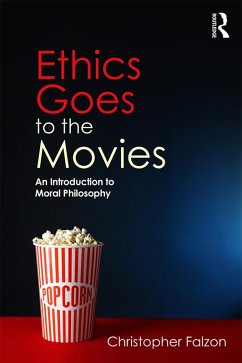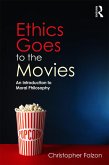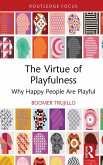40,95 €
40,95 €
inkl. MwSt.
Sofort per Download lieferbar

20 °P sammeln
40,95 €
Als Download kaufen

40,95 €
inkl. MwSt.
Sofort per Download lieferbar

20 °P sammeln
Jetzt verschenken
Alle Infos zum eBook verschenken
40,95 €
inkl. MwSt.
Sofort per Download lieferbar
Alle Infos zum eBook verschenken

20 °P sammeln
- Format: PDF
- Merkliste
- Auf die Merkliste
- Bewerten Bewerten
- Teilen
- Produkt teilen
- Produkterinnerung
- Produkterinnerung

Bitte loggen Sie sich zunächst in Ihr Kundenkonto ein oder registrieren Sie sich bei
bücher.de, um das eBook-Abo tolino select nutzen zu können.
Hier können Sie sich einloggen
Hier können Sie sich einloggen
Sie sind bereits eingeloggt. Klicken Sie auf 2. tolino select Abo, um fortzufahren.

Bitte loggen Sie sich zunächst in Ihr Kundenkonto ein oder registrieren Sie sich bei bücher.de, um das eBook-Abo tolino select nutzen zu können.
In this book, Christopher Falzon uses movies to provide a rich survey of moral positions as they have emerged through history.
- Geräte: PC
- mit Kopierschutz
- eBook Hilfe
- Größe: 2.2MB
Andere Kunden interessierten sich auch für
![Ethics Goes to the Movies (eBook, ePUB) Ethics Goes to the Movies (eBook, ePUB)]() Christopher FalzonEthics Goes to the Movies (eBook, ePUB)40,95 €
Christopher FalzonEthics Goes to the Movies (eBook, ePUB)40,95 €![The Routledge Companion to Virtue Ethics (eBook, PDF) The Routledge Companion to Virtue Ethics (eBook, PDF)]() The Routledge Companion to Virtue Ethics (eBook, PDF)50,95 €
The Routledge Companion to Virtue Ethics (eBook, PDF)50,95 €![Experiments in Film and Philosophy (eBook, PDF) Experiments in Film and Philosophy (eBook, PDF)]() Christopher FalzonExperiments in Film and Philosophy (eBook, PDF)40,95 €
Christopher FalzonExperiments in Film and Philosophy (eBook, PDF)40,95 €![The Ethics of Love (eBook, PDF) The Ethics of Love (eBook, PDF)]() Susi FerrarelloThe Ethics of Love (eBook, PDF)40,95 €
Susi FerrarelloThe Ethics of Love (eBook, PDF)40,95 €![Routledge Companion to Philosophy of Religion (eBook, PDF) Routledge Companion to Philosophy of Religion (eBook, PDF)]() Routledge Companion to Philosophy of Religion (eBook, PDF)62,95 €
Routledge Companion to Philosophy of Religion (eBook, PDF)62,95 €![Routledge Philosophy GuideBook to Nietzsche on Art (eBook, PDF) Routledge Philosophy GuideBook to Nietzsche on Art (eBook, PDF)]() Aaron RidleyRoutledge Philosophy GuideBook to Nietzsche on Art (eBook, PDF)35,95 €
Aaron RidleyRoutledge Philosophy GuideBook to Nietzsche on Art (eBook, PDF)35,95 €![The Virtue of Playfulness (eBook, PDF) The Virtue of Playfulness (eBook, PDF)]() Boomer TrujilloThe Virtue of Playfulness (eBook, PDF)22,95 €
Boomer TrujilloThe Virtue of Playfulness (eBook, PDF)22,95 €-
-
-
In this book, Christopher Falzon uses movies to provide a rich survey of moral positions as they have emerged through history.
Dieser Download kann aus rechtlichen Gründen nur mit Rechnungsadresse in A, B, BG, CY, CZ, D, DK, EW, E, FIN, F, GR, HR, H, IRL, I, LT, L, LR, M, NL, PL, P, R, S, SLO, SK ausgeliefert werden.
Produktdetails
- Produktdetails
- Verlag: Taylor & Francis eBooks
- Seitenzahl: 316
- Erscheinungstermin: 7. Dezember 2018
- Englisch
- ISBN-13: 9781317383277
- Artikelnr.: 55072383
- Verlag: Taylor & Francis eBooks
- Seitenzahl: 316
- Erscheinungstermin: 7. Dezember 2018
- Englisch
- ISBN-13: 9781317383277
- Artikelnr.: 55072383
- Herstellerkennzeichnung Die Herstellerinformationen sind derzeit nicht verfügbar.
Christopher Falzon is a Senior Lecturer in Philosophy at the University of Newcastle, Australia. He is the author of Foucault and Social Dialogue (1998) and Philosophy Goes to the Movies (3rd edition, 2014), and the co-editor of Foucault and Philosophy (2010) and A Blackwell Companion to Foucault (2013).
Acknowledgements
Introduction - Rear Window Ethics
What is ethics?
Film as experimental
Exploring ethics through film
Chapter 1. Excess and obsession - Ancient ethics
Why be moral
Plato's moral theory
Aristotle and virtue ethics
Stoicism
Epicureanism
Feature films: Dr Jekyll and Mr Hyde, and Under the Skin
Chapter 2. Sin and self-denial: Religious ethics
Divine command
Augustine
Aquinas and natural law
The problem of evil
Feature films: Crimes and Misdemeanors, and The Addiction
Chapter 3. Pleasure, happiness and rights: Enlightenment ethics
Hobbes and the social contract
Enlightenment and happiness
Utilitarianism
Rights
The libertine and scientific morality
Feature films: Dirty Harry, and The Dark Knight
Chapter 4. Personhood and autonomy: Kantian ethics
Duty and desire
Persons
Autonomy
Marx
Habermas and discourse ethics
Feature films: High Noon, and No Country for Old Men
Chapter 5. Slaves, supermen and authentic selves: Existentialist ethics
Nietzsche
Kierkegaard
Twentieth-century existentialism: Sartre et al.
The social situation: de Beauvoir
Feature films: Rope, and Fight Club
Chapter 6. Encounters with aliens: Ethics and the other
The critique of 'traditional' ethics
The ethics of care
Levinas and the ethics of the other
Foucault, ethics and power
Experiments in living
Feature films: Casablanca, and Force Majeure
Filmography
Glossary
Bibliography
Index
Introduction - Rear Window Ethics
What is ethics?
Film as experimental
Exploring ethics through film
Chapter 1. Excess and obsession - Ancient ethics
Why be moral
Plato's moral theory
Aristotle and virtue ethics
Stoicism
Epicureanism
Feature films: Dr Jekyll and Mr Hyde, and Under the Skin
Chapter 2. Sin and self-denial: Religious ethics
Divine command
Augustine
Aquinas and natural law
The problem of evil
Feature films: Crimes and Misdemeanors, and The Addiction
Chapter 3. Pleasure, happiness and rights: Enlightenment ethics
Hobbes and the social contract
Enlightenment and happiness
Utilitarianism
Rights
The libertine and scientific morality
Feature films: Dirty Harry, and The Dark Knight
Chapter 4. Personhood and autonomy: Kantian ethics
Duty and desire
Persons
Autonomy
Marx
Habermas and discourse ethics
Feature films: High Noon, and No Country for Old Men
Chapter 5. Slaves, supermen and authentic selves: Existentialist ethics
Nietzsche
Kierkegaard
Twentieth-century existentialism: Sartre et al.
The social situation: de Beauvoir
Feature films: Rope, and Fight Club
Chapter 6. Encounters with aliens: Ethics and the other
The critique of 'traditional' ethics
The ethics of care
Levinas and the ethics of the other
Foucault, ethics and power
Experiments in living
Feature films: Casablanca, and Force Majeure
Filmography
Glossary
Bibliography
Index
Acknowledgements
Introduction - Rear Window Ethics
What is ethics?
Film as experimental
Exploring ethics through film
Chapter 1. Excess and obsession - Ancient ethics
Why be moral
Plato's moral theory
Aristotle and virtue ethics
Stoicism
Epicureanism
Feature films: Dr Jekyll and Mr Hyde, and Under the Skin
Chapter 2. Sin and self-denial: Religious ethics
Divine command
Augustine
Aquinas and natural law
The problem of evil
Feature films: Crimes and Misdemeanors, and The Addiction
Chapter 3. Pleasure, happiness and rights: Enlightenment ethics
Hobbes and the social contract
Enlightenment and happiness
Utilitarianism
Rights
The libertine and scientific morality
Feature films: Dirty Harry, and The Dark Knight
Chapter 4. Personhood and autonomy: Kantian ethics
Duty and desire
Persons
Autonomy
Marx
Habermas and discourse ethics
Feature films: High Noon, and No Country for Old Men
Chapter 5. Slaves, supermen and authentic selves: Existentialist ethics
Nietzsche
Kierkegaard
Twentieth-century existentialism: Sartre et al.
The social situation: de Beauvoir
Feature films: Rope, and Fight Club
Chapter 6. Encounters with aliens: Ethics and the other
The critique of 'traditional' ethics
The ethics of care
Levinas and the ethics of the other
Foucault, ethics and power
Experiments in living
Feature films: Casablanca, and Force Majeure
Filmography
Glossary
Bibliography
Index
Introduction - Rear Window Ethics
What is ethics?
Film as experimental
Exploring ethics through film
Chapter 1. Excess and obsession - Ancient ethics
Why be moral
Plato's moral theory
Aristotle and virtue ethics
Stoicism
Epicureanism
Feature films: Dr Jekyll and Mr Hyde, and Under the Skin
Chapter 2. Sin and self-denial: Religious ethics
Divine command
Augustine
Aquinas and natural law
The problem of evil
Feature films: Crimes and Misdemeanors, and The Addiction
Chapter 3. Pleasure, happiness and rights: Enlightenment ethics
Hobbes and the social contract
Enlightenment and happiness
Utilitarianism
Rights
The libertine and scientific morality
Feature films: Dirty Harry, and The Dark Knight
Chapter 4. Personhood and autonomy: Kantian ethics
Duty and desire
Persons
Autonomy
Marx
Habermas and discourse ethics
Feature films: High Noon, and No Country for Old Men
Chapter 5. Slaves, supermen and authentic selves: Existentialist ethics
Nietzsche
Kierkegaard
Twentieth-century existentialism: Sartre et al.
The social situation: de Beauvoir
Feature films: Rope, and Fight Club
Chapter 6. Encounters with aliens: Ethics and the other
The critique of 'traditional' ethics
The ethics of care
Levinas and the ethics of the other
Foucault, ethics and power
Experiments in living
Feature films: Casablanca, and Force Majeure
Filmography
Glossary
Bibliography
Index
Acknowledgements
Introduction - Rear Window Ethics
What is ethics?
Film as experimental
Exploring ethics through film
Chapter 1. Excess and obsession - Ancient ethics
Why be moral
Plato's moral theory
Aristotle and virtue ethics
Stoicism
Epicureanism
Feature films: Dr Jekyll and Mr Hyde, and Under the Skin
Chapter 2. Sin and self-denial: Religious ethics
Divine command
Augustine
Aquinas and natural law
The problem of evil
Feature films: Crimes and Misdemeanors, and The Addiction
Chapter 3. Pleasure, happiness and rights: Enlightenment ethics
Hobbes and the social contract
Enlightenment and happiness
Utilitarianism
Rights
The libertine and scientific morality
Feature films: Dirty Harry, and The Dark Knight
Chapter 4. Personhood and autonomy: Kantian ethics
Duty and desire
Persons
Autonomy
Marx
Habermas and discourse ethics
Feature films: High Noon, and No Country for Old Men
Chapter 5. Slaves, supermen and authentic selves: Existentialist ethics
Nietzsche
Kierkegaard
Twentieth-century existentialism: Sartre et al.
The social situation: de Beauvoir
Feature films: Rope, and Fight Club
Chapter 6. Encounters with aliens: Ethics and the other
The critique of 'traditional' ethics
The ethics of care
Levinas and the ethics of the other
Foucault, ethics and power
Experiments in living
Feature films: Casablanca, and Force Majeure
Filmography
Glossary
Bibliography
Index
Introduction - Rear Window Ethics
What is ethics?
Film as experimental
Exploring ethics through film
Chapter 1. Excess and obsession - Ancient ethics
Why be moral
Plato's moral theory
Aristotle and virtue ethics
Stoicism
Epicureanism
Feature films: Dr Jekyll and Mr Hyde, and Under the Skin
Chapter 2. Sin and self-denial: Religious ethics
Divine command
Augustine
Aquinas and natural law
The problem of evil
Feature films: Crimes and Misdemeanors, and The Addiction
Chapter 3. Pleasure, happiness and rights: Enlightenment ethics
Hobbes and the social contract
Enlightenment and happiness
Utilitarianism
Rights
The libertine and scientific morality
Feature films: Dirty Harry, and The Dark Knight
Chapter 4. Personhood and autonomy: Kantian ethics
Duty and desire
Persons
Autonomy
Marx
Habermas and discourse ethics
Feature films: High Noon, and No Country for Old Men
Chapter 5. Slaves, supermen and authentic selves: Existentialist ethics
Nietzsche
Kierkegaard
Twentieth-century existentialism: Sartre et al.
The social situation: de Beauvoir
Feature films: Rope, and Fight Club
Chapter 6. Encounters with aliens: Ethics and the other
The critique of 'traditional' ethics
The ethics of care
Levinas and the ethics of the other
Foucault, ethics and power
Experiments in living
Feature films: Casablanca, and Force Majeure
Filmography
Glossary
Bibliography
Index
Acknowledgements
Introduction - Rear Window Ethics
What is ethics?
Film as experimental
Exploring ethics through film
Chapter 1. Excess and obsession - Ancient ethics
Why be moral
Plato's moral theory
Aristotle and virtue ethics
Stoicism
Epicureanism
Feature films: Dr Jekyll and Mr Hyde, and Under the Skin
Chapter 2. Sin and self-denial: Religious ethics
Divine command
Augustine
Aquinas and natural law
The problem of evil
Feature films: Crimes and Misdemeanors, and The Addiction
Chapter 3. Pleasure, happiness and rights: Enlightenment ethics
Hobbes and the social contract
Enlightenment and happiness
Utilitarianism
Rights
The libertine and scientific morality
Feature films: Dirty Harry, and The Dark Knight
Chapter 4. Personhood and autonomy: Kantian ethics
Duty and desire
Persons
Autonomy
Marx
Habermas and discourse ethics
Feature films: High Noon, and No Country for Old Men
Chapter 5. Slaves, supermen and authentic selves: Existentialist ethics
Nietzsche
Kierkegaard
Twentieth-century existentialism: Sartre et al.
The social situation: de Beauvoir
Feature films: Rope, and Fight Club
Chapter 6. Encounters with aliens: Ethics and the other
The critique of 'traditional' ethics
The ethics of care
Levinas and the ethics of the other
Foucault, ethics and power
Experiments in living
Feature films: Casablanca, and Force Majeure
Filmography
Glossary
Bibliography
Index
Introduction - Rear Window Ethics
What is ethics?
Film as experimental
Exploring ethics through film
Chapter 1. Excess and obsession - Ancient ethics
Why be moral
Plato's moral theory
Aristotle and virtue ethics
Stoicism
Epicureanism
Feature films: Dr Jekyll and Mr Hyde, and Under the Skin
Chapter 2. Sin and self-denial: Religious ethics
Divine command
Augustine
Aquinas and natural law
The problem of evil
Feature films: Crimes and Misdemeanors, and The Addiction
Chapter 3. Pleasure, happiness and rights: Enlightenment ethics
Hobbes and the social contract
Enlightenment and happiness
Utilitarianism
Rights
The libertine and scientific morality
Feature films: Dirty Harry, and The Dark Knight
Chapter 4. Personhood and autonomy: Kantian ethics
Duty and desire
Persons
Autonomy
Marx
Habermas and discourse ethics
Feature films: High Noon, and No Country for Old Men
Chapter 5. Slaves, supermen and authentic selves: Existentialist ethics
Nietzsche
Kierkegaard
Twentieth-century existentialism: Sartre et al.
The social situation: de Beauvoir
Feature films: Rope, and Fight Club
Chapter 6. Encounters with aliens: Ethics and the other
The critique of 'traditional' ethics
The ethics of care
Levinas and the ethics of the other
Foucault, ethics and power
Experiments in living
Feature films: Casablanca, and Force Majeure
Filmography
Glossary
Bibliography
Index
'Christopher Falzon has written another exemplary book, which makes an important contribution to introducing students and the general public to the basic areas of ethical theory. His vast knowledge of films, from the silent era to the present day, provides an accessible way to engage the reader and clarify moral dilemmas.'
-Timothy J. Madigan, St John Fisher College, USA
-Timothy J. Madigan, St John Fisher College, USA







